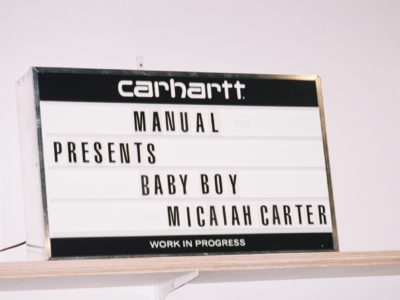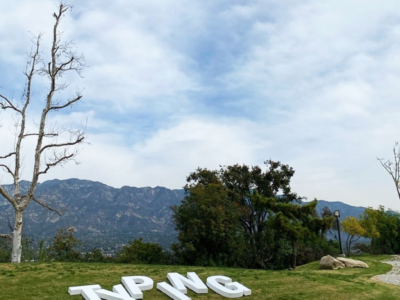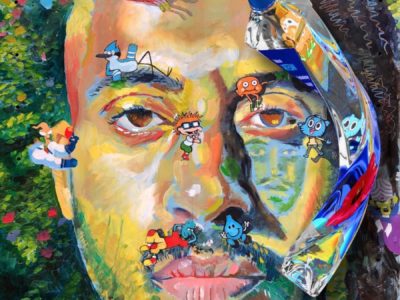Catching up with George Lewis Jr. — aka Twin Shadow
Catching up with George Lewis Jr. — aka Twin Shadow
George Lewis Jr. — better known as Twin Shadow — just released a teaser for his much-anticipated upcoming album, due out in August. The track, “Truly” is embellished with a complex production of orchestral strings, bachata guitar riffs and reggaeton beats, giving us a taste of his Dominican roots. In between collaborating on a country music project, finishing the new album and tuning his Triumph Bonneville, the musician, producer and actor took a minute to catch up with us amongst the dancing palm trees of Los Angeles.

Hey, how are you? Good! I was just doing some recording. I’m glad we’re finally catching up. What were you recording? A friend of mine from Brooklyn is working on a country record and I’m helping her produce it. Oh wow. How long have you been working on that? For about two weeks. We’re close to being done. It’s pretty cool. Is that a totally different experience, producing country versus pop? Not really — I kind of have a secret country past. What’s your secret country past? Well I’m from Florida, so I’ve always loved country music and grew up listening to it. It’s kind of just a muscle that I haven’t been able to flex in a while. How do you differentiate between country music and pop? Because a lot of what is called country is definitely more pop — like very produced. It’s kind of something we’ve been trying to tackle while working on the record. You can kind of think of it holistically that like, if anything is sort of redneck, it’s country. Like pop-country and typical country, anything can qualify. But we’re going towards a traditional thing. We’re taking a more ’90s country, Shania Twain and Jeff Brooks direction — Chris Isaac and stuff like that. That’s kind of when country music was at its last peak. So you grew up in Florida? Yeah, I’m from the Tampa Bay area. I spent 16 years there. What was it like growing up there? Boring, but people from Florida kind of understand why it has a strange magic to it that is hard to explain. It’s also the same reason why the “Florida Man” thing is hard to explain. It’s just a bizarre place. You’ve always played music? Yeah since I was 14. More seriously at 16.
Did your parents influence that all? Not really, they weren’t musicians. It was the people in high school and middle school that influenced me. It’s something I kind of gravitated towards. I also sang a lot in the church choir, which was my first introduction to music. Later, my friend Ricky and I used to pretend to be in an RnB group together, but we could never find our other two members. The two of us would sing Fugees records on the basketball court. We wanted to be a group like Boyz II Men. We didn’t really know what we were doing. I also played saxophone in my high school band. And there was this kid who played guitar. I was always impressed on how much attention he got when played. That’s what drew me in to learn how to play guitar. Picking up girls? Not necessarily, just attention in general. There were always people crowding around him and it was like this weird phenomenon. When did this start happening for you? I immediately picked up the guitar and started bringing it to school. Half of the time I’d just walk around with it; it sort of lived with me everywhere I went. It worked sometimes. I mean, when you’re playing guitar and singing outside people will definitely crowd around you. What were you doing in New York when you moved here? I worked at a pizza shop and produced music for this dance company. It was kind of a weird first job, but pretty cool because I got to make music with a cello player and a keyboard player — who is actually still in my live band. Just like everybody in New York, I was just going to art parties and basement shows and getting really fucked up all the time and figuring out life. Music was a goal, but living in New York was a day-to-day thing at that time. How did it start to slide into success? It was built out of frustration. I didn’t really like doing any other jobs, although I was working in music. I didn’t understand how to create music with someone else’s vision, so I started working on my own projects. I had been in bands before. I was in a punk band. I don’t know. At some point I just started to focus on a sound, and experiment a lot on new things. And I started to learn how to record and produce for myself. That opened a huge door to actually having a career in the industry, when I realized I could record music and play all these instruments. How did you initially record everything? I had a really small amount of equipment. I have a four-track tape deck that I just learned how to use. I saved 150 bucks and started making recordings on it — learning mostly from lots of tutorials on YouTube. I spent hours and hours learning and experimenting. It’s amazing to think about what it was like years ago and how much more stuff is on YouTube now. I’m just thinking of before, the rabbit holes you could go down, you could view the weirdest and coolest things without having to watch 20 ads.

Why did you decide to make the move to LA — and how can you stay there? My hobby is motorcycles and old cars, so I couldn’t do that in New York. I would go on tour and come back to New York and my motorcycle would have half of its parts stolen and I had no money to buy more. So it was a nightmare to keep that going. I was seduced by LA from all the space. I got an apartment that’s almost a house and it cost less than a spot in Bushwick. I’m an island boy and from the Dominican Republic, so the weather is big for me too. I did eight winters in New York so I guess it was time for me to throw in the towel. What kind of cars do you have? A 1971 Ford F250, Triumph Thruxton, Triumph Bonneville and a Datsun 280. I work on them everyday. You have a new album coming out in August? How is it going? It’s going good! I got a lot on my plate but I’m very excited about it. I’ve been trapping myself in the studio, recording until it’s done. Where are you recording? I was recording at the Hollywood Roosevelt for a minute. I have a friend who’s the son of the owner, Jason, and he had this room there and he didn’t know what to do with it. So I worked with him and suggested to have him build a studio there. So as it was being built, I used it to try out the space. It’s pretty special. Now I’m just recording at my house in Beachwood Canyon. So the Roosevelt has this space for other musicians to record? They’re also turning it to a sort of venue for musicians to perform. Like a small intimate venue for around 60 people.
What’s the experience of working with a larger label than a smaller one? I can write a dissertation about being in the label system but it’d probably bore most people. There’s loads of differences for what people assume. But I think it’s important for musicians to think that a label is a bank that you borrow money from. And when you’re done borrowing the money you slowly pay it back or you don’t. With some labels, you kind of have more of a creative relationship with. My first label was Terrible Records and I had a great relationship with them. It was based off friendship and creativity. Moving to bigger labels, things become more formal and business-like. A relationship is necessary for some people. I wouldn’t say it’s too much of a difference, except bigger labels have more money. I’ve heard feedback from female musicians that it’s much freer for them to work with smaller labels or be without one as the larger ones are very controlling when it comes to not only their sound, but their everyday appearance. Do you think this is different between men and women? I think there’s a classic problem. There’s way too many men in the music industry and there’s no balance. So you have a lot of slightly older men in the label system that behaved the same way in the ’70s and ’80s — wanting to control things and not signing people for the right reasons. For sure, for women there’s a huge pressure because your label is run by mostly men, many of which are douchebags. So you have this disadvantage. But I think that is changing. There are a lot more females in A&R, which is exciting. It’s bound to change like everything else, because the old way doesn’t work anymore. I hope people see that. They do and it’s inevitable. Unfortunately, capitalism will find a way to fuck everybody and to keep us in a format to work and sell our things. Capitalism isn’t going away because we love it. We are obsessed with it. Look at the fashion world. Everyone thinks fashion is so forward-thinking, but it is the center of new capitalism. The things we care about, our priorities are rarely in check. We’re going to have to deal with that with some point. In another interview you were talking about how you listen to the universe — you take in and let things come as they are. Do you believe in synchronicity? Yes, especially when you produce music or when you get into any sort of music production, you pay attention to waves and soundwaves, harmonies and all of these things. You realize that there are all sorts of patterns in nature and music instruments and when these patterns line up you get all of these beautiful harmonious things, which echo through all aspects of life. It’s all there. Check out George’s clothes and accessories on Basic.Space









